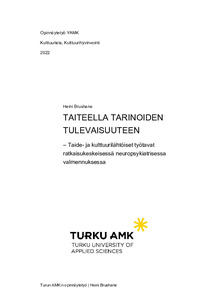Taiteella tarinoiden tulevaisuuteen : taide- ja kulttuurilähtöiset työtavat ratkaisukeskeisessä neuropsykiatrisessa valmennuksessa
Brushane, Heini (2022)
Brushane, Heini
2022
Julkaisun pysyvä osoite on
https://urn.fi/URN:NBN:fi:amk-2022060214452
https://urn.fi/URN:NBN:fi:amk-2022060214452
Tiivistelmä
Opinnäytetyö tarkastelee taide- ja kulttuurilähtöistä työotetta ja siihen liittyviä sanoituksia nepsy-valmentajien työssä valmentajille suunnatun Webropol-kyselyn ja kehittämistyöpajan avulla. Työn tavoite on selvittää, millaisia taide- ja kulttuurilähtöisiä työtapoja valmentajilla on käytössään ja millaisia käyttökokemuksia näistä työtavoista on. Lisäksi tavoite on selvittää, onko tarvetta verkostolle, joka kokoaa yhteen näiden työtapojen osaajia ja mahdollistaa valmentajille ammatillista tukea sekä mahdollisesti myöhemmin lisäkoulutusta.
Työn tarkoituksena on vahvistaa taide- ja kulttuurilähtöisten työtapojen asemaa ja madaltaa kynnystä niiden käyttöönottoon nepsy-valmennuksessa, tuottaa valmentajille työvälineitä ja tarjota mahdollisuutta verkostoitumiseen.
Opinnäytetyö määrittelee kulttuurisen nepsy-valmennuksen käsitettä ja ehdottaa kulttuurinen nepsy-valmennus -termin käyttöön ottoa, koska tätä kokonaisuutta kuvaavaa sanaa ei ole vielä alalla käytössä. Taidelähtöiset ja kulttuuriset työtavat ovat luonteva osa nepsy-valmennusta eli kyse ei ole uudesta menetelmästä vaan nepsy-valmennuksen jäsentyvästä alakäsitteestä. The thesis examines the use of arts- and culture-based approach and related terminology in the work of neuropsychiatric coaches through a Webropol survey and development workshop for coaches. The aim of the work is to find out what kind of arts- and culture-based working practices coaches use and what kind of user experiences they have of these working practices. In addition, the aim was to find out whether there is a need for a network that would bring together experts in the field and provide coaches professional support and further training organized by the network.
The purpose of the work is to strengthen the role of arts- and culture-based working practices, to lower the threshold for their use in neuropsychiatric coaching and to provide coaches with tools and an opportunity for networking.
The thesis defines the concept and suggests the use of the term cultural neuropsychiatric coaching because there is not yet a concept or term that describes the approach in use. Arts- and culture-based working practices are a natural part of neuropsychiatric coaching, so it is not a new method but a sub-concept of neuropsychiatric coaching.
Työn tarkoituksena on vahvistaa taide- ja kulttuurilähtöisten työtapojen asemaa ja madaltaa kynnystä niiden käyttöönottoon nepsy-valmennuksessa, tuottaa valmentajille työvälineitä ja tarjota mahdollisuutta verkostoitumiseen.
Opinnäytetyö määrittelee kulttuurisen nepsy-valmennuksen käsitettä ja ehdottaa kulttuurinen nepsy-valmennus -termin käyttöön ottoa, koska tätä kokonaisuutta kuvaavaa sanaa ei ole vielä alalla käytössä. Taidelähtöiset ja kulttuuriset työtavat ovat luonteva osa nepsy-valmennusta eli kyse ei ole uudesta menetelmästä vaan nepsy-valmennuksen jäsentyvästä alakäsitteestä.
The purpose of the work is to strengthen the role of arts- and culture-based working practices, to lower the threshold for their use in neuropsychiatric coaching and to provide coaches with tools and an opportunity for networking.
The thesis defines the concept and suggests the use of the term cultural neuropsychiatric coaching because there is not yet a concept or term that describes the approach in use. Arts- and culture-based working practices are a natural part of neuropsychiatric coaching, so it is not a new method but a sub-concept of neuropsychiatric coaching.
